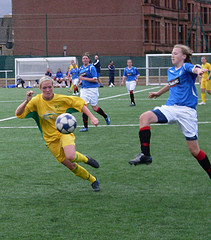Gender inequality on the pitch: Women’s Football
Although crowds are increasing, women’s football still lags behind its male counterparts in terms of funding, media interest  and crowd turnout. The record high salaries of male Premiere League players has no equivalent in the women’s game. In a recognition of the inequality facing the women’s game, the English Football Association (FA) went to Sweden in early February 2009 to learn how to improve the image, reputation and popularity of women’s football. In Sweden, a former player Susanne Erlandsson is the vice-president of the country’s FA – a situation not replicated in England where the hierarchy is male-dominated. In addition, the games are telecast to approximately 400, 000 people per week.
and crowd turnout. The record high salaries of male Premiere League players has no equivalent in the women’s game. In a recognition of the inequality facing the women’s game, the English Football Association (FA) went to Sweden in early February 2009 to learn how to improve the image, reputation and popularity of women’s football. In Sweden, a former player Susanne Erlandsson is the vice-president of the country’s FA – a situation not replicated in England where the hierarchy is male-dominated. In addition, the games are telecast to approximately 400, 000 people per week.
Table of Contents
- 1 Pay gap
- 2 Women’s Football and the Media
- 3 The the record so far is 135, 000 GBP per week.
The English Women’s national team recently complained to the FA for the low salaries earned by players during the last World Cup: players were paid 40 GBP per day. Players at the national level have to combine another employment with playing professional football.
This is perhaps all the more ironic with the greater success of some women’s national teams compared to their male male peers: the English women’s team has faced no problems qualifying for the Euro 2009 in Finland; and the German women’s team boasts two consecutive World Cup wins after its 2007 victory over Brazil in the final.
Women’s Football and the Media
Sports journalist, Georgina Turner, investigating the Guardian’s football archives back to 1998, found that only 303 articles have been written about women’s football. In contrast, the Manchester United manager, Sir Alex Ferguson has 184 articles all of his own, and 388 articles were written about one team, Coventry City. Turner links the marginalisation of women’s football in the media with the interest of journalists, predominantly male, and smaller budgets allocated to covering women’s sports in general.
The largest sporting audience ever for a women’s event was the 90,000 spectators who watched the 1999 Women’s World Cup final between the USA and China; in contrast, in contrast the 2006 FIFA Men’s World Cup final was watched by 15.1 million individuals (a ninth of the entire population of the planet).
The Global Game
According to FIFA statistics, there are 26 million girls and women in 180 countries who play football. The first World Championship was held in 1991 in China. FIFA’s records show that in the last 10 years, women’s participation in football has increased by 210% in the USA, by 250% in Switzerland and by 160% in Germany. Many other countries, notably in Africa, have shown similar growth in women’s football.
References
See Also
- Women in Sports


